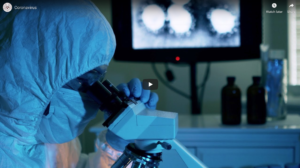COVID-19 Experts From Texas A&M System Fight Fear With Facts

 COLLEGE STATION, Texas — Scientists from The Texas A&M University System are helping the state, the nation and the world better understand, prepare for and respond to the outbreak of COVID-19.
COLLEGE STATION, Texas — Scientists from The Texas A&M University System are helping the state, the nation and the world better understand, prepare for and respond to the outbreak of COVID-19.
They fight fear with facts. They offer the calming context that comes from decades of study into pandemics and coronaviruses.
“It’s no wonder that so many authorities turn to us,” said John Sharp, Chancellor of the Texas A&M system. “The scientists here are uniquely qualified to help policymakers and ordinary people understand this outbreak.”
See related video here: Coronavirus
Federal officials in Washington D.C. and state leaders in Austin have sought out the pandemic experts at the Bush School of Government and Public Service at Texas A&M University, where the Scowcroft Institute of International Affairs offers policy guidance on prevention and response.
Among the experts is Dr. Gerald Parker, who also serves as associate dean of Global One Health at the University College of Veterinary Medicine & Biomedical Sciences.
Dr. Parker is a former deputy secretary for chemical and biological defense at the U.S. Defense Department and a former assistant secretary for preparedness and response at the Department of Health and Human Services.
“This is a brand new virus,” Dr. Parker said “There’s so much that we don’t know that it is just naturally alarming to us as human beings.
“But what we’re doing today is phenomenally much better today than it was 20 years ago,” Parker said. “The scientific enterprise across the globe is responding with unprecedented speed.”
Another leading scientist is Dr. Ben Neuman, head of the biology department at Texas A&M University-Texarkana, a researcher who has worked with coronaviruses for 24 years.
Dr. Neuman serves on the international committee that named the latest virus, and he has been interviewed by news reporters throughout Europe and Asia as well as North America.
“Coronaviruses don’t really want to kill you, they really want to hide,” Dr. Neuman said. “They are very good at basically sneaking around your immune system, and cutting all the wires that would let your body know that it’s infected.
“When you or I get sick,” he added, “we actually have enough viruses inside of us to infect every single person on the face of the earth — just concentrated in one body. It’s kind of a miracle that everybody’s not sick all the time.
“Our immune system is great at its job. And frankly, that’s what makes life possible.”
Dr. Parker encourages people to seek advice from the U.S. Center for Disease Control, the Texas Department of State Health Services and local public health authorities.
“We need to be ready in case we do see more cases in our community,” he said. “But there’s no need to panic.”
About The Texas A&M University System
The Texas A&M University System is one of the largest systems of higher education in the nation, with a budget of $6.3 billion. Through a statewide network of 11 universities, a comprehensive health science center, eight state agencies, and the RELLIS Campus, the Texas A&M System educates more than 151,000 students and makes more than 22 million additional educational contacts through service and outreach programs each year. System-wide, research and development expenditures exceeded $1 billion in FY 2019 and helped drive the state’s economy.
Contact: Mike Reilly
Director of Communications
(979) 458-6492
(402) 679-0456 cell